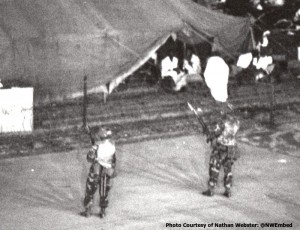Who Are the History Makers?
Growing up in the 90’s, I remember hearing my parents talk about the Gulf War, the Rwandan Genocide, and the Oklahoma City bombings, but I do not recall them ever discussing the heartbreaking situation of the thousands of Haitian asylum seekers detained at Guantánamo Bay. This is not their fault; most of America had no concept of what was going on in Haiti and Guantánamo at that time. As Nathan Webster, a member of an Army public affairs unit who arrived at Guantánamo on Thanksgiving Day, 1991, recalled, “the public had no idea. We were there to write for the government, that’s it.”
My eyes were opened many years later when I began dating a Haitian-American. While he never mentioned Guantánamo (his family had been in the United States since the mid 1980’s), based on what he told me about Haitian history, I found it unsurprising that the early 1990s had been a time of political unrest in Haiti. The involvement of the United States did not surprise me either. What shocked me was that the United States refused to treat the Haitians on Guantánamo, many of whom had HIV, with basic human decency. Immigration to the U.S. was common, yet these people were not given access to lawyers during their INS proceedings; the U.S. cited the fact that Guantánamo was technically in Cuba and therefore not on U.S. soil. Given the magnitude of the situation, how could the world not know?
When I asked Webster what the public, and mainstream press knew about the situation, he replied that “nobody knew because there was no media there. The only media was me, well, and my- our team, and the photos I took… I think there was a conscious effort to- I think they wanted positive control …I don’t think there was any malicious intent. I mean, that’s what our job was- they’re not my photos, you know?” As a government employee, Webster articulated the key point- he was just doing his job. He had no control over what the public knew; responsibility for that decision was claimed by people higher on the totem pole. The government was in control of public access to Guantánamo for a long time, and so created its own version of history.
This situation begs the question: Who are the history makers? Who are the consumers? As Winston Churchill said, “history is written by the victors.” The same is true of those in power. Think of the magnitude of this. Between 1991 and 1992, Nathan Webster and his colleges were in charge of all public records of the treatment of Haitians on Guantánamo. Even a preliminary Google search will not pull up any news articles about the situation written until the end of 1992. A full year of history went unreported, as if it never happened. We, as the consumers of history, must ask where the information is coming from. The winners or the losers?
Posted by Jordana Green – MA Candidate at Northeastern University
One Comment to: Who Are the History Makers?


February 10, 2014 2:18 pmNathan Webster wrote:
Just to fill in a blank here – by “positive control,” I meant that the command of the Joint Task Force wanted possession of the original negatives/photographs of the 1991-92 Haitian mission. I don’t think there was malicious intent, but by taking the negatives from the photographer’s (mine) possession they are giving them to ‘upstream’ officials who don’t really have any context for what they’re looking at.
Consequently, nobody could look at the photos and say “these are important!” because they didn’t know. I wasn’t there to explain what they were looking at.
The problem is that with one exception – a brief visit by Jesse Jackson – there was little/no mainstream coverage of the mission, and so my photos were the only real record of what was going on.
Since they now, at best, reside in some long-forgotten filing cabinet, there’s no longer any sort of usable historical record, which is a shame. I don’t feel any blame – my job was internal public affairs reporting for a military audience, not historical documentation – but it is a shame that nobody had the long view of what kind of historical record we had created, which is now lost.
In this case, the history wasn’t written by losers or winners. It wasn’t written at all.